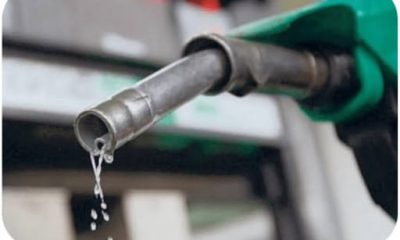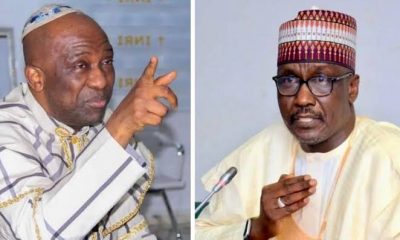Business
WHY IS PETROLEUM A PROBLEM IN NIGERIA

WHY IS PETROLEUM A PROBLEM IN NIGERIA
By Dickson Omobola
The jigsaw puzzle surrounding the quantity of petrol, otherwise called Premium Motor Spirit (PMS), Nigeria consumes daily just got more puzzling as Sunday Vanguard understands that the figure went down to about 30 million liters per day after President Bola Tinubu’s ”subsidy is gone” statement of May 29, 2023 only to dramatically return to more than 60 million liters.
Multiple sources attributed the ‘magical’ rise to renewed smuggling of the product into neighboring countries where the price of the product is significantly higher than it is in Nigeria.
Until Tinubu ‘removed’ petrol subsidy via the 2023 Inauguration Day speech, the product sold for N254 but rose subsequently to N617 in Abuja and thereabouts in some parts of the country.
Injuries, male colleagues’ attitude almost made me quit welding – Zainab Giwa, Yaba Tech graduate0:16 / 1:00
keep watching
In Lagos where it was cheapest, it sold for about N568 while it sold higher in other South-West states like Ogun, Oyo, Ondo, Osun and Ekiti.
In the North, South-South and South-East, it was a different ballgame as the price of petrol skyrocketed above N615 while independent marketers sold above N800.
The quantity of petrol consumed daily in Nigeria has for a long time been a controversial issue with many stakeholders saying it was shrouded in secrecy especially since the quantity determined the amount to be paid as subsidy which many people including government officials benefited from.
According to the Nigerian National Petroleum Corporation Limited (NNPCL), in the first three months of 2022, Nigeria recorded an average daily consumption of 64.14 million liters, while the Nigerian Midstream and Downstream Petroleum Regulatory Authority (NMDPRA) revealed in September 2022 that Nigeria’s average daily petrol consumption was 66.8 million liters.
However, at the beginning of 2023, the Group Chief Executive Officer of the NNPC Limited, Mele Kyari, said there was no credible data to ascertain the daily consumption of petrol in Nigeria while also stating that there was credible data on the actual volume of petrol evacuated from the depots.
Analysts believe the figures quoted are often that high because the bulk of the petrol earmarked for the local market is usually taken by smugglers across the borders, especially to neighboring countries, where the price of the product is very high because they don’t produce oil.
The smuggling of the product across the borders guarantees huge profits for those involved while subsidy also guarantees huge returns for marketers and government officials among others in the system.
But following the Inauguration Day pronouncement of Tinubu (subsidy is gone), daily consumption of petrol in Nigeria, according to sector regulator fell significantly.
Analysis of daily truck-out data published by the NMDPRA revealed that petrol consumption had reduced by more than 24 million liters per day on average.
The average daily consumption in May 2023 was 69.54 million liters which fell to 49.48 million liters in June, representing a 28.3% drop.
In July, this margin increased further to 34.61%, the equivalent of 24.06 million liters, and average daily consumption for the month fell further to 45.74 million liters.
The price of petrol in neighboring Benin Republic and Cameroon immediately soared, confirming the claim that both countries, among others, were befitting from the Nigerian subsidy regime.
Outside beneficiaries
Part of the reason adduced by the Nigerian government to cancel the subsidy regime is the fact that apart from the cabal using the regime to rip off government, nationals of neighboring were also beneficiaries.
But critics say the fact that government cannot police its borders in such a way that smuggling of petrol across the borders is stopped does not justify ending the subsidy regime that helps poor Nigerians to modulate the prices of other items that they need petrol to carry out.
Nigeria’s land borders are huge, covering an
Business
Nigeria’s Inflation Drops to 15.10% as NBS Reports Deflationary Trend

Nigeria’s headline inflation rate declined to 15.10 per cent in January 2026, marking a significant drop from 27.61 per cent recorded in January 2025, according to the latest Consumer Price Index (CPI) report released by the National Bureau of Statistics.
The report also showed that month-on-month inflation recorded a deflationary trend of –2.88 per cent, representing a 3.42 percentage-point decrease compared to December 2025. Analysts say the development signals easing price pressures across key sectors of the economy.
Food inflation stood at 8.89 per cent year-on-year, down from 29.63 per cent in January 2025. On a month-on-month basis, food prices declined by 6.02 per cent, reflecting lower costs in several staple commodities.
The data suggests a sustained downward trajectory in inflation over the past 12 months, pointing to improving macroeconomic stability.
The administration of President Bola Ahmed Tinubu has consistently attributed recent economic adjustments to ongoing fiscal and monetary reforms aimed at stabilising prices, boosting agricultural output, and strengthening domestic supply chains.
Economic analysts note that while the latest figures indicate progress, sustaining the downward trend will depend on continued policy discipline, exchange rate stability, and improvements in food production and distribution.
The January report provides one of the clearest indications yet that inflationary pressures, which surged in early 2025, may be moderating.
Bank
Alpha Morgan to Host 19th Economic Review Webinar

Alpha Morgan to Host 19th Economic Review Webinar
In an economy shaped by constant shifts, the edge often belongs to those with the right information.
On Wednesday, February 25, 2026, Alpha Morgan Bank will host the 19th edition of its Economic Review Webinar, a high-level thought leadership session designed to equip businesses, investors, and individuals with timely financial and economic insight.
The session, which will hold live on Zoom at 10:00am WAT and will feature economist Bismarck Rewane, who will examine the key signals influencing Nigeria’s economic direction in 2026, including policy trends, market movements, and global developments shaping the local landscape.
With a consistent track record of delivering clarity in uncertain times, the Alpha Morgan Economic Review continues to provide practical context for decision-making in a dynamic environment.
Registration for the 19th Alpha Morgan Economic Review is free and can be completed via https://bit.ly/registeramerseries19
It is a bi-monthly platform that is open to the public and is held virtually.
Visit www.alphamorganbank to know more.
Business
GTBank Launches Quick Airtime Loan at 2.95%

GTBank Launches Quick Airtime Loan at 2.95%
Guaranty Trust Bank Ltd (GTBank), the flagship banking franchise of GTCO Plc, Africa’s leading financial services group, today announced the launch of Quick Airtime Loan, an innovative digital solution that gives customers instant access to airtime when they run out of call credit and have limited funds in their bank accounts, ensuring customers can stay connected when it matters most.
In today’s always-on world, running out of airtime is more than a minor inconvenience. It can mean missed opportunities, disrupted plans, and lost connections, often at the very moment when funds are tight, and options are limited. Quick Airtime Loan was created to solve this problem, offering customers instant access to airtime on credit, directly from their bank. With Quick Airtime Loan, eligible GTBank customers can access from ₦100 and up to ₦10,000 by dialing *737*90#. Available across all major mobile networks in Nigeria, the service will soon expand to include data loans, further strengthening its proposition as a reliable on-demand platform.
For years, the airtime credit market has been dominated by Telcos, where charges for this service are at 15%. GTBank is now changing the narrative by offering a customer-centric, bank-led digital alternative priced at 2.95%. Built on transparency, convenience and affordability, Quick Airtime Loan has the potential to broaden access to airtime, deliver meaningful cost savings for millions of Nigerians, and redefine how financial services show up in everyday life, not just in banking moments.
Commenting on the product launch, Miriam Olusanya, Managing Director of Guaranty Trust Bank Ltd, said: “Quick Airtime Loan reflects GTBank’s continued focus on delivering digital solutions that are relevant, accessible, and built around real customer needs. The solution underscores the power of a connected financial ecosystem, combining GTBank’s digital reach and lending expertise with the capabilities of HabariPay to deliver a smooth, end-to-end experience. By leveraging unique strengths across the Group, we are able to accelerate innovation, strengthen execution, and deliver a more integrated customer experience across all our service channels.”
Importantly, Quick Airtime Loan highlights GTCO’s evolution as a fully diversified financial services group. Leveraging HabariPay’s Squad, the solution reinforces the Group’s ecosystem proposition by bringing together banking, payment technology, and digital channels to deliver intuitive, one-stop experiences for customers.
With this new product launch, Guaranty Trust Bank is extending its legacy of pioneering digital-first solutions that have redefined customer access to financial services across the industry, building on the proven strength of its widely adopted QuickCredit offering and the convenience of the Bank’s iconic *737# USSD Banking platform.
About Guaranty Trust Bank
Guaranty Trust Bank (GTBank) is the flagship banking franchise of GTCO Plc, a leading financial services group with a strong presence across Africa and the United Kingdom. The Bank is widely recognized for its leadership in digital banking, customer experience, and innovative financial solutions that deliver value to individuals, businesses, and communities.
About HabariPay
HabariPay is the payments fintech subsidiary of GTCO Plc, focused on enabling fast, secure, and accessible digital payments for individuals and businesses. By integrating payments and digital technology, HabariPay supports innovative services that make everyday financial interactions simpler and more seamless.
Enquiries:
GTCO
Group Corporate Communication
[email protected]
+234-1-2715227
www.gtcoplc.com
-

 celebrity radar - gossips6 months ago
celebrity radar - gossips6 months agoWhy Babangida’s Hilltop Home Became Nigeria’s Political “Mecca”
-

 society6 months ago
society6 months agoPower is a Loan, Not a Possession: The Sacred Duty of Planting People
-

 society5 months ago
society5 months agoReligion: Africa’s Oldest Weapon of Enslavement and the Forgotten Truth
-

 news6 months ago
news6 months agoTHE APPOINTMENT OF WASIU AYINDE BY THE FEDERAL GOVERNMENT AS AN AMBASSADOR SOUNDS EMBARRASSING









